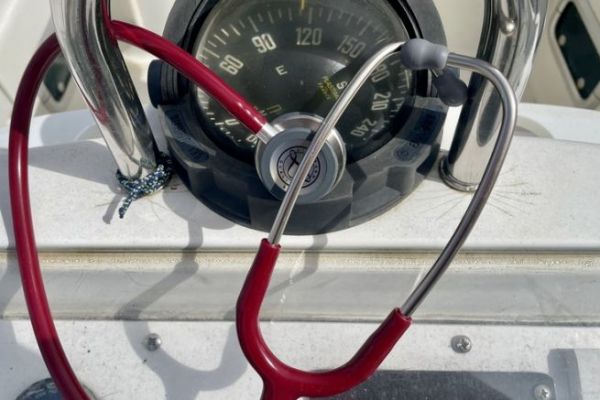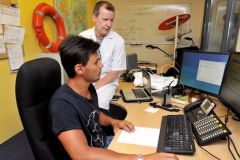Making an appointment with your GP: an essential step
A medical consultation prior to departure enables us to take stock of the overall state of health of each crew member. It is advisable to inform your doctor in advance, in order to benefit from an extended consultation, particularly for :
- Update routine vaccinations
- Renew usual treatments in sufficient quantities for the duration of the trip
- Establish the necessary prescriptions for the on-board pharmacy
- If necessary, discuss referral to a specialist
It's also an opportunity to talk about travel conditions (isolation, duration, climate, physical activity on board) and to gather appropriate preventive advice.
Cardiology consultation: prevention is better than cure!

For some crew members, a cardiological assessment is essential, particularly in the presence of cardiovascular risk factors:
- age (men > 55, women > 65)
- early family history
- tobacco
- hypertension
- hypercholesterolemia
- diabetes
- abdominal obesity
- chronic stress
- anxiety or depressive disorders
If necessary, an electrocardiogram (ECG), cardiac ultrasound or stress test can be performed.
It is compulsory for professional seafarers as soon as a single risk factor is identified.
Don't neglect dental check-ups
A toothache at sea can quickly turn into a nightmare. Before setting sail, a visit to the dentist is recommended, even in the absence of pain, to detect any latent cavities or infections.
It's best to plan ahead for this appointment several weeks before boarding, so as to be able to carry out the necessary treatments.
Consultation at the International Traveler Center (CVI)
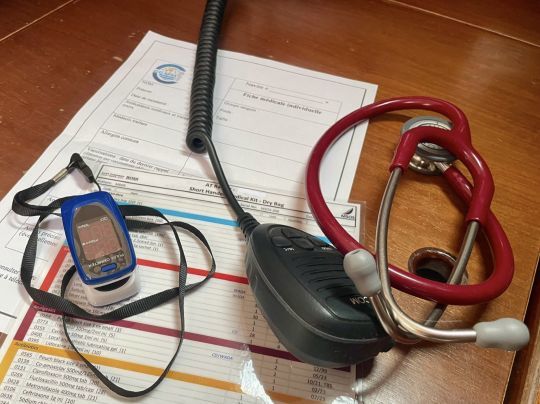
Indispensable for any trip to the intertropical zone, the "traveler's consultation" allows :
- receive specific vaccinations (such as yellow fever, mandatory for French Guiana and recommended for other countries)
- prevention advice on diseases specific to these regions
Please note: these consultations and vaccinations are often at the traveler's expense. Remember to check whether your health insurance may reimburse part of the cost.
Contact details for the nearest CVI are easily available online.
Adapting preparation to crew composition
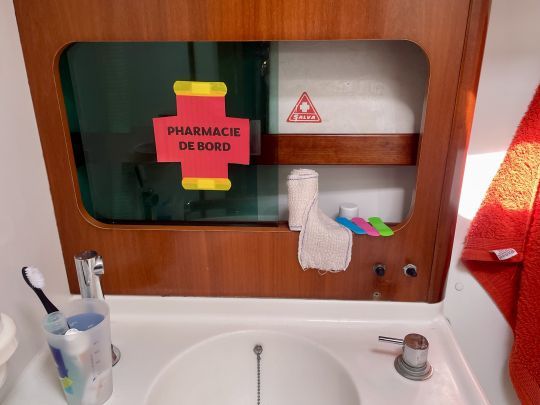
Each crew member has specific health needs. It's essential to adapt your preparation accordingly.
Women's health : think about a pre-departure check-up
- Carry out a gynaecological check-up, especially in the case of heavy, painful or irregular periods
- Carry out recommended screening tests (especially for cervical cancer)
- Adapt contraception to the duration and conditions of the trip, and ensure an adequate supply
A simple oversight can quickly become a complex issue on board.
With children on board anticipate and adapt
- Check that their vaccination schedule is up to date, or even anticipate certain vaccinations
- Adapt the on-board pharmacy to their weight and age: painkillers, antipyretics, antihistamines, anti-nausea treatments, adapted bandages...
- Take along a reliable thermometer, oral rehydration solutions and appropriate sun and mosquito protection
It's a good idea to take your child's health record with you: it contains all antecedents, vaccinations and treatments, and can be invaluable in the event of a consultation abroad.
In case of chronic pathology prepare a clear protocol
- Schedule an appointment with the specialist to reassess treatment and arrange further tests if necessary.
- Set up a protocol for monitoring and recognizing warning signs with your GP.
- Anticipate prescriptions and ensure adequate stock of medication, with prior agreement from the Assurance Maladie if necessary
The role of the pharmacist: a key partner
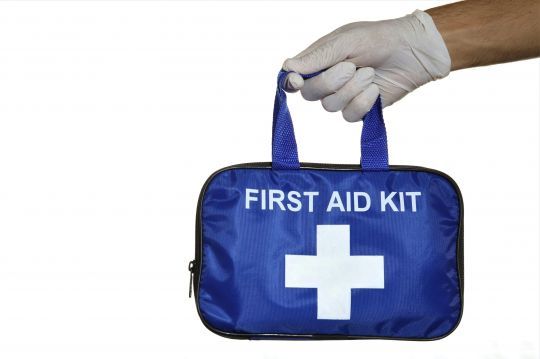
The pharmacist plays a major role in preparing your departure. Discussions with him or her can :
- adapt the pharmacy to the project (destination, duration, storage conditions),
- anticipate order lead times, evaluate with him the most suitable forms of medication and ask him for long expiration dates, particularly useful for long journeys.
- assistance in setting up an on-board pharmacy.
- practical advice on prevention and hygiene when travelling
The individual medical form: an essential prerequisite
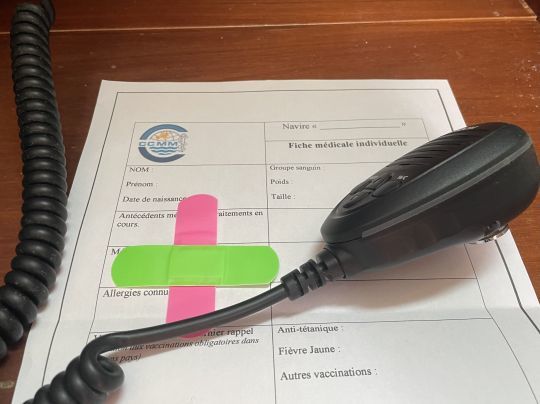
Each crew member should fill in a confidential individual medical form, listing his or her history and current treatments.
The Centre de Consultation Médicale Maritime (CCMM) offers a standard model.
It is advisable to e-mail the form to the CCMM before departure, along with a copy of the on-board pharmacy to facilitate any medical recommendations.
Medical insurance: an essential aspect not to be overlooked
Before you leave, it's vital to check that your medical insurance covers the risks you incur.
For large-scale projects (e.g. round-the-world tours), it's best to take out a specific policy with a specialized insurer. Be sure to check repatriation conditions.
For travel within Europe, the European Health Insurance Card (EHIC) is often sufficient.
The process can be lengthy: plan ahead several months in advance for peace of mind.
Conclusion: come back in top form!
Preparing for a boat trip also means looking after the well-being of your crew.
By anticipating the medical aspects, you reinforce the autonomy of the boat and ensure more serene navigation.
A well-prepared adventure has every chance of reaching its destination âeuros in tip-top shape!

 /
/ 